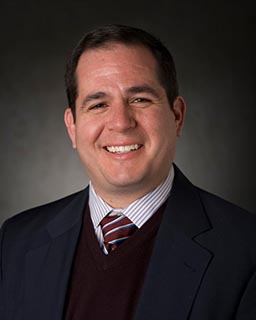Biomedical engineer elected to two national societies
Keefe Manning, professor of biomedical engineering, was selected for his interdisciplinary work in the cardiovascular system and biomaterials mechanics
2/17/2021
By Ashley J. WennersHerron
UNIVERSITY PARK, Pa. — Keefe Manning, professor of biomedical engineering and surgery at Penn State, has been elected as a fellow of both the American Institute for Medical and Biological Engineering (AIMBE) and the American Society of Mechanical Engineers (ASME).
Manning, who is also the associate dean for the Schreyer Honors College, studies different technologies implanted in the cardiovascular system. He aims to understand the fluid mechanics associated with clotting, with the goal of helping mitigate secondary health issues such as life-threatening, device-induced clots.
“It’s a niche field,” said Manning, who focused primarily on technology development during his doctoral research and postdoctoral training. “It wasn’t until I was hired as faculty that I started thinking about the bigger questions of how the fluid mechanics of clotting could affect implanted technologies.”
Now, 17 years into his faculty career at Penn State, Manning said he believes he is just at the beginning of understanding the interplay between clotting and technology and how to use that knowledge to design better devices.
“Keefe is humble, but his work speaks for itself,” said Cheng Dong, distinguished professor and head of the Department of Biomedical Engineering at Penn State. “His work in fluid mechanics has proved invaluable in the understanding and development of biomaterials.”
His contributions are reflected in his election to the AIMBE College of Fellows, a peer-nominated, peer-reviewed and peer-elected process that is considered one of the highest professional honors for medical and biological engineers. Manning is the eighth AIMBE fellow elected from Penn State’s Department of Biomedical Engineering.
“It’s recognition from your peers, who have seen you grow throughout your career,” Manning said. “For me, it’s recognition that my entire research group — my postdocs, research staff, students — is impactful, not only in the work conducted but also in the training facilitated. It’s nice.”
ASME, based on peer nominations, bestows fellow status on fewer than 4% of the society’s more than 94,000 members, recognizing at least 10 years of a member’s “significant engineering achievements.” Manning has been an ASME member since he was an undergraduate bioengineering student at Texas A&M University. He noted that typically a non-mechanical engineer might not join the society, but as a biomedical engineer conducting mechanically related work, it made sense.
“Being able to participate in another discipline and being recognized for the contributions to that discipline — it’s noteworthy,” Manning said. “I do this work because I love it. I love trying to discover new things and to understand what’s happening with the body, and — most of all — to help the next generation of researchers get to their goals.”
Manning joined Penn State in 2001 as a postdoctoral scholar before being hired as an assistant professor in 2004. Prior to joining Penn State, Manning earned his doctorate in biomedical engineering at the Virginia Commonwealth University and both his bachelor’s and master’s degrees in bioengineering from Texas A&M University. A member of multiple professional societies, Manning has served on multiple review committees and boards, published more than 80 papers in peer-reviewed journals and received several accolades throughout his career.
“The biggest highlight, the highest honor, are the students,” Manning said of the more than 100 undergraduate and graduate students who conducted research under his mentorship. “There are so many talented students, and they are critical for our society. They’ll get some spark that will lead to the next innovation, the newest technology. That’s where time invested is time well spent.”




